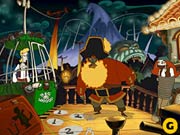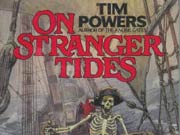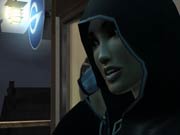Designer Threads feat. Ron Gilbert - 6/30/06
Legendary game designer Ron Gilbert speaks with GameSpot's Executive Editor Greg Kasavin about the secret of Monkey Island, the Commodore 64, why you shouldn't get into the games business, and much more.
Following is an excerpt of the conversation with Ron Gilbert. Listen to the podcast for much more and check out Ron Gilbert's Web site at www.grumpygamer.com.

Game designer Ron Gilbert joined us in our studio. He's worked on many classic LucasArts games, well-regarded children's titles, and more.
Greg Kasavin: So, what are the main things that you think have changed in game development since when you were getting started working on Maniac Mansion, Secret of Monkey Island and stuff like that? How is it different now?
Ron Gilbert: Well, I think it's bigger, and I think that's probably the biggest change that's happened. It's just a much bigger industry. There's a lot more money at stake and as soon as you start spending millions of dollars to make something, it's a lot harder to just kind of go off with a small team and make something and see if it's interesting or not because you have a lot of money on the line. You have marketing departments. You have PR departments. You have all these people now because it's an event, in a way, and so I think that makes it a lot harder to just kind of rush out and do different things. You know, success is 90 percent failure and if you can't have the opportunity to fail, you're just not going to be able to do interesting things. I think that is one of the problems that the games business has now--there is just no room for that failure, to try new things.
GK: Well, but the failure happens anyway, doesn't it?
RG: It happens, but they're not good failures. You know, it's like you can look at any--
GK: ...They're not experiments.
RG: ...any kind of song, music, movie, anything, and you can go, "Yeah, that's really bad, but--." Right? And you can pull all these really good things out of it and go, "You know, I can use these in mine." Or "I know they're going to do it better the next time." But I think you have a lot of failures in games that are just failures because nobody tried, nobody cared. It was all about marketing. It was--you know, those aren't the right reasons to fail.

Gilbert was producer on the memorable 1997 real-time strategy game, Total Annihilation. His colleague, Chris Taylor, is now working on a game that's considered its spiritual successor.
GK: Right. But despite all this, you're still at it, right?
RG: You know, nobody's going to hire me to do anything else, so I've got--I'm stuck in this business.[laughs]
GK: Oh, well, but are you saying it's just a job?
RG: No, no. No, it's not a job at all. I mean, if I just wanted a job, I would go do something else. But I think it's fun. I mean, I've been in this business almost since its inception, and I enjoy it at some levels, frustrating as it can be. I don't want to do anything else. I like to do this.
GK: Just got to get some of the obstacles out of the way, huh?
RG: Yes. You know, it's pushing through. It's trying to find publishers that are willing to take a risk on different types of games, smaller budget games. So far, that's not really the mindset that they have, but I keep pushing forward.
GK: Do you think the circumstances are such that some of these guys who have been really risk averse are going to have to start taking more risks, just because you can't just put out another World War II-themed first person shooter and hope that's going to be a huge success anymore, right? It seems like people's demands are changing somewhat.
RG: Oh, I think they have to change. Will they change? I don't know, but they have to change. I mean, if this really is going to be a creative force on par with, you know, movies and music and a lot of other art forms, it has to change. It has to become a multi-tiered business, where you have the blockbusters at the top that are making a lot of money, and then you have all these other tiers of games that are being professionally produced by the publishers, being sold to people. When you get that kind of tiered system, it's a great system to have because you can bring in people at the bottom. You can spend a little bit of money getting their project made. You can help develop talent there. You can get new ideas. You can breed studios. There are all these things you do in that system, but we don't have that. We just have maybe the top two layers of that system. We don't have any of that other stuff underneath it, and that has to change in this business.

Ron Gilbert worked on many children's games, but to him, they were more than just games for kids. Maybe that's why they turned out to be good.
GK: Right. But you think others see it this way as well, right?
RG: I think a lot of people see it like this.
GK: So, what's going to happen? Someone could mobilize an army and make this work, or--?
RG: I think one of two things will happen. I think that either the whole business will collapse at some point just because it's so top heavy that it just cannot sustain itself and, you know, it'll be reborn in a different way or somebody will just do that and will win really big, and everybody will copy it. I mean, it's not going to...you could take somebody like Electronic Arts going, "You know, we're going to start another brand. It's going to be a whole separate brand, and we're going to fund lower budget projects and, you know, we're going to get these more independent developers, and we're going to give them the support, we're going to give them the money so the craftsmanship is up there." And all it's going to take is for them to win at that, and everybody else would do it. Everybody will see the advantages, but somebody has got to do it first.
Agree or disagree with Ron's views? Got comments or feedback about the format of Designer Threads? Suggestions for future guests? Let us know!
GK: Yes. Well, here's hoping. On a separate subject, your games are known for their humor. Why do you think so few games are funny...?
RG: Well, you know, comedy's hard. It really is. I think it's one of those things that it's very...it's very tough to do comedy. I think there's a lot of issues that make comedy particularly hard in games. In some ways, comedy is all about timing, and in games you've turned the timing over to the player. So, it is very, very difficult to do kind of that timing- and pacing-oriented comedy in games.

Ron Gilbert's holding out on revealing what "The Secret" of Monkey Island is in the off chance he gets a shot at working on another game in the series.
GK: Unless it's in like a noninteractive cutscene or something like that?
RG: Yes, and those I don't think are particularly funny either because, you know, I don't play games to watch a movie. I play games to play a game, so if I'm going to have humor, it needs to come very quick in very short little bursts. You know, I think you can put a lot of slap stick humor and stuff in games but doing that kind of more-sophisticated humor, I think, is just very hard. Honestly, I think the real problem is that game developers just aren't that funny. And I really think it's that simple.
GK: Yes. Well, they're good at explosions.
RG: Yes, they are--and then there's some people, like Tim Schafer, who's a genius at that kind of comedy stuff... But there's Tim Schafer.
GK: Indeed.
RG: Who else? Hmm. There's Tim Schafer...you know, there just aren't a lot of people that are working in this business that I think are really kind of that intrinsically funny and understand comedy.
GK: Right. You worked with Tim Schafer for a while, right?
RG: Yes, I hired Tim Schafer at LucasArts.
GK: Nice. I'm sure he owes you for that.
RG: Oh, I keep reminding him of that, but he seems to forget.[laughs]
GK: What was it like working with a guy like that?
RG: Oh, it was great. You know, we hired Tim Schafer and Dave Grossman. I hired them both at the same time, and they were both on Monkey Island and they're both just incredibly funny people but in very different ways. Dave Grossman is very kind of a dry, sarcastic humor, where Tim's is just a little more in your face, which was great having them work on the same project because I could really kind of assign them to different characters in the game and different scenes depending on kind of how I wanted the comedy for that thing to work. But they were great. They were great to work with.
GK: Chris Taylor is a funny guy in real life too, isn't he? The guy who is credited for kind of being the creative force behind Total Annihilation.
RG: Yes, Chris is a very funny guy and then he does serious RTS games. You know, he seems to have absolutely no interest in taking his humor and applying it to games, which always kind of confused me with him.
GK: Well, whatever works, right? As long as people like the games?
RG: Yes, if you love what you're doing, then great.
GK: Have you seen much on Supreme Commander, the game he's working on right now?
RG: No. I've actually seen nothing at all on it.

Along with Disney's Pirates of the Caribbean ride, the novel On Stranger Times helped influence the Monkey Island series.
GK: It looks cool. I mean, everyone seems to recognize the roots of it, whoever played Total Annihilation back in the day. Some concepts, I guess, don't go out of style. We're talking about all these games from way back when--what's it like to be best known for works that happened a while ago, frankly?
RG: You know, I think it's great that people, like you were saying before, that people still play that stuff, that people are still playing Monkey Island. They're still into Monkey Island. There are still Monkey Island Web sites that are still being updated on a daily basis. I think it's really great to have created something or worked on something that even to this day people are still interested in and still very fixated on. It's great to have done that.
GK: Do you intend to top that? It's going to be hard to live up to something like that again?
RG: No, I very much want to top it. I mean, I'm currently working on a game that's kind of a combination of an RPG and an adventure game, taking the elements of those two things that I enjoy the most. I'm designing that and out pitching it to publishers right now, which is, you know, it's a very hard pitch. I think our game really will bring a lot of those things that people just loved about those games to something a little more current. So, yes, I definitely want to try to top all that stuff.
GK: And speaking of Monkey Island, did you ever plan on revealing what exactly the secret is?
RG: I had definitely planned on doing that in the third game, yes. There's no question about that, but, you know, and then when Jonathan and Larry made Monkey Island III, which is a great game...I think they did a fabulous job on that. They didn't know what the secret was. I told nobody. So, you know, they weren't really able to kind of reveal that, but I would love to make another Monkey Island game. If I could make another one...I have this whole story mapped out in my head for how I want to tie it all together with the other two games, kind of bring it all back to the original thing, and that would just be a dream of mine.
GK: So, you want to hold on to the secret just in case?
RG: Yes. You know, I should probably write it down and give it to my lawyer to reveal on my death. I keep saying that, but then I think, "God, do I really want that?" Because you know, some crazed fan is going to figure, "Well, you know, I know how to get the secret. I know exactly."
GK: ...Rub him out. See, I've already thought of it, so that could be the premise of the next Hitman game or something like that. Hitman in real life. Anyway, you've probably seen Pirates of the Caribbean and stuff like that? I've heard before that that was--that the ride was kind of a spiritual inspiration for that series or what have you. Is that true?
RG: Yes. There were really two things that really inspired me for that game. One was the ride, Pirates of the Caribbean, and the other was a book that I read called On Stranger Tides, and I think those two things kind of coming together were really the genesis behind that whole idea. Yes.
GK: Do you like the movie?
RG: I love the movie, yes. The movie was great. I went into the theatre just expecting to hate it. I'd just go, "Oh, my God, this is going to be horrible. It's going to be the same old crappy stuff." But, you know, they just nailed it. They nailed just every piece of that. If there was a Monkey Island movie, I'd want it to look like that.
GK: Yes. Surprises do happen. That movie did seem to have just about everything going against it. A Disney movie based on a ride, so--.
RG: But, you know, the Haunted House movie came out at the exact same time, and where's that?
GK: I saw that on a plane... I've seen worse, but hey. Eddie Murphy went on to do donkey voices, so...
Speaking of movies, what's the last movie you watched? Do you watch a lot of movies?
RG: Yes, I watch a lot of movies. The last movie I saw was actually last night--was A Prairie Home Companion.
GK: Well, I can't say I've seen that one. Any good?
RG: I liked it, actually. It's--Robert Altman did it, and I really, I'm a big fan of Robert Altman movies, so I kind of enjoyed it.
GK: Yes. If you want to talk comic timing or at least good dialogue.
RG: Yes, he's got a great dialogue. It's also one of the things that I love about Woody Allen movies, is just the dialogue. It's just fabulous to just kind of go listen to it all.
GK: Can you think of many games that actually had good dialogue in them from your perspective?
RG: Well, you know, not if it wasn't done by Tim. Tim's games always have really great dialogue in them but most of the time it's just--it's like, you know, fingers down the chalkboard.
GK: Why do you think that is?

Hey, not every game with great dialogue was written by Tim Schafer. Take Dreamfall by Ragnar Tornquist, for example.
RG: I think it's because the writers don't really understand the interactive medium, and I think what happens is a lot of game companies will go hire, you know, Hollywood writers to write their stuff, and these people are very good at writing scenes and they kind of understand that but they don't understand the process of interactive writing. They don't understand how you kind of turn the whole story inside out when you're doing that. So, what they tend to do is they tend to write cutscenes for you, but they don't really flow together very well. So, you know, it's just...it's just not that interesting.
GK: You've probably seen how there's all this now college curriculum around gaming because, you know, there's a lot of money in the business and people want to get into it in a more formal way. Do you have high hopes for that stuff, or do you think they're not teaching practical material there?
RG: I do have high hopes for that. I think that kind of stuff is absolutely critical to this business. You need to have really good curriculum, much like film school that people can go to. They can produce interesting things. They can learn the craftsmanship. They can learn the creative piece of the business and be able to come out and do stuff. I think it's absolutely critical. I really support that stuff. But I don't know that they're doing all the right things yet. I mean, it's so very, very early, you know, a lot of it...they're still attached to the computer science programs.
GK: Right. Right.
RG: You know, they need to get divorced from that. I mean, this--the game design stuff needs to be in the same groups that are doing the theatre and the writing and the film making. It is not computer science.
GK: Maybe much like with what you talked about where, you know, it's going to take some blockbuster kind of Indie game from a spin-off brand. Maybe all it takes is some relatively well known game designer emerging out of a college curriculum like that to set it ablaze.
RG: Yes, I know. I think that's true. I mean, film schools have been around for a long time, and you suddenly started to get these people, these...George Lucas came out of film school and Scorsese and all these people. That's when you kind of started to really realize, "Oh, the film school." It's not a trade school, and I think we need to have that happen at some point in our future.
GK: Right. So, these days you're working on the game project you mentioned...is that taking up most of your time?
RG: You know, it doesn't take up a lot of time. A lot of it is just calling up publishers and trying to make contacts and talking to people and trying to push the idea through, which is a pretty uphill battle for what I'm trying to do, since it's not...doesn't really fit into that mainstream game mold. I've been doing some work with casual games, which is also a very interesting alley off the mainstream game development stuff. That's very, very, very fascinating. It's interesting to work on games that are very small teams again, where it's just, you know, one programmer and a couple of artists or a couple of programmers. I think that stuff is interesting.
The casual games business, from a business standpoint, is also very fascinating to see how that's all evolving, and is that going to go anywhere beyond, you know, just kind of these soccer mom games? Is that going to somehow come around and merge with the hard-core gaming or, you know, even better, is it going to create this whole different type of gamer out there? That stuff is interesting to see.
GK: Yes, Microsoft was talking about that Xbox Live Anywhere stuff where you might have all this stuff interacting one day where you've got your kind of lighter, portable version of your game on your handset and then your progress transfers over to your console--stuff like that.
RG: Right.
Listen to the podcast for the complete interview!
Agree or disagree with Ron's views? Got comments or feedback about the format of Designer Threads? Suggestions for future guests? Let us know!
Got a news tip or want to contact us directly? Email news@gamespot.com
Join the conversation